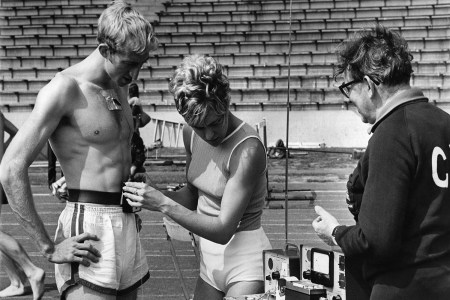On a busy October afternoon in Ark Karajan Place in the bustling Tokyo Metropolis, 70 people took their places, plopped down inside a taped-off square of floorspace and…did nothing.
At first glance, there was nothing to link these people. This wasn’t a climate protest, or a political movement. They weren’t angry about the economy. They weren’t interested in gender rights, more days off of work or whether the trains ran on time. Their ages, backgrounds and even nationalities varied.
The one trait they did share was a massive, near-overwhelming sense of stress in their daily lives.
By taking a seat in a busy public space resembling not so much a zen garden, but a shopping mall with vines climbing towards high, vaulted ceilings, this disparate group was taking a stand against the noise of their own minds. This was no silent demonstration, but a fiercely competitive 90-minute challenge in which Japan’s most stressed out people came to do as little as humanly possible.
What Is the Space-Out Competition?
“People living in a busy city feel anxious when they do nothing,” explains Woopsyang. The artist, who goes by a pseudonym, is one of the founders of the international Space-Out Competition, an event series designed to overcome the anxiety of doing very little in an always-on culture.
Office culture in Japan, where “salaryman” is one of the most common and honorable professions, can be stifling. Ditto: pretty much any other country in the world. With constant social media comparisons, side hustles and a society that celebrates hard work above all else, our collective exhaustion has only been exacerbated, driving workers across the globe into a trend of burnout and “quiet quitting.”
“People these days work very hard but they cannot enjoy free time. More work is always waiting and it makes us nervous when we choose to do nothing instead of being productive,” Woopsyang says. “I thought that if I gathered people to space out and do nothing together, we wouldn’t be nervous anymore.”
For Woopsyang, the collective act of sitting and doing nothing is as much an art project as a competitive event. “[Many] dress to represent their profession,” she says. “Together, they represent a small city of stillness, while spectators form fast-moving dots around them. It’s a striking visual contrast.”

How Do You “Win”?
The rules for the Space-Out Competition are simple. Competitors are free to alter their position as often as they like — you don’t have to hold a lotus pose for an hour and a half. Most choose to lie on their backs or stomach. If you’ve ever tried guided meditation, you’ve probably heard experts advise against such relaxed positions due to the high likelihood of inadvertently catching some Zs. But many competitors take the risk, even though sleeping results in immediate disqualification. The same goes for laughing or chatting. Music is also banned.
“It’s the quietest competition in the world,” Woopsyang says. And that’s kind of the point.
If the players do need a bathroom break, they can communicate using colored cards and be excused. When 90 minutes are up, the 10 players who seem the most relaxed are chosen by judges. Of these, the person whose heart rate graph shows the steadiest downward trend throughout the competition is declared the winner.
Woopsyang likens the process to a sort of unconscious act, in the same way that deep sleepers don’t tend to give much thought to why they sleep so well. “Only those who struggle with insomnia ponder deeply about how to get a good night’s sleep,” she says.
“Many people ask me how to get good at spacing out or staying focused,” she adds. “Honestly, I’d like to know the secret myself.”
How to Lower Your Resting Heart Rate Below 60 BPM
Make like an elite athlete and slow down your tickerWhy We Need to Space Out
If the Space-Out Competition doesn’t offer solid advice on how to deal with stress, it at least encourages us to think more deeply about what is bothering us, and how we might address it in a meaningful way.
For Soa Kwon, who won the Seoul leg earlier this year, the competition has completely shifted her ideas about how she uses her time. She used to see spacing out between work tasks as a problem, but the event taught her that down time is never wasted time, and that she is actually good at controlling her mental energies.
“It gave me an assurance that doing nothing is not bad, and has many benefits,” she says. “I absolutely recommend the competition, especially for people who feel anxious or even guilty about taking a rest. Korea is a very competitive country where people do not find rest even after work is over.”
Kwon had been aware of the competition since seeing a news story about the first one, which took place in Seoul 10 years ago. She always thought she’d be good at it as she has a slow heart rate and does not “get swayed by [her] surroundings easily.”
When it came to competing, she found it to be completely different from other sports; because the focus is on doing nothing, there was no pressure or stress at all. “It was a fun, unique and relaxing experience,” she says. “Although there are rules to follow, for someone who is good at doing nothing, it was a piece of cake.”

“It’s Difficult to Take a Break”
Hong Kong’s Hercules Chan won the international competition in 2017. His experience has led him to start his own mental health business, and to form a new appreciation of quiet moments.
“Taking part in the competition was both funny and challenging at the same time,” he says. “I tried to be still for the entire duration of the competition, but there were flies and sunshine which made it difficult. I learned that something that looks very easy could actually be very hard.”
As it turns out, doing nothing can be just as difficult as plowing through a never-ending to-do list. “We should not overlook how difficult it can be to take a break,” he says. “I wish more people would appreciate its importance.”
More and more of us are learning this lesson. Since its inception in Korea in 2014, the competition has found appreciative competitors everywhere from Beijing, to Hong Kong, Minato City and Suwon. It’s been so popular that Woopsyang has lost track of how many events have been held over the past 10 years, but estimates it’s well into the dozens, with multiple local and international contests taking place each year.
The event first came to Tokyo in 2023. Woopsyang says that just one year into the Japanese iteration, the competition has gained recognition in Japanese society, and the understanding of its purpose has significantly grown, bringing in more participants to this year’s sophomore event.
“We’re receiving a lot of emails from countries interested in hosting competitions,” she says. “I’d like to share this unproductive time with many more people from many more countries. Ultimately, I even dream of creating a ‘World Spacing Out Day’ — a day when everyone on Earth stops for a moment at the same time, doing nothing together for a short while. Wouldn’t it be the world’s largest, quietest festival?”
Until then, Space-Out competitors will continue to value their 90-minute oasis of calm among the chaos of daily life. As one competitor puts it: “The world does not stop, only us.”
Whether you’re looking to get into shape, or just get out of a funk, The Charge has got you covered. Sign up for our new wellness newsletter today.

























